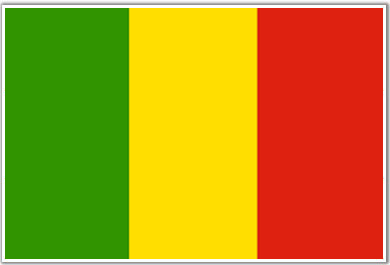Four months after presidential elections in Mali, voters are now choosing a new National Assembly. They appear undeterred by ongoing clashes in the north.
Step by step, the process of restoring democracy in Mali is underway. On Sunday (24.11.2013) 6.5 million Malians take part in the democratic exercise of electing a new parliament. 1,141 candidates are running for 147 seats in the National Assembly. Many Malians hope that the new parliament will help bring the crisis in their country to an end.
It started in March 2012 when the army launched a coup against incumbent president Amadou Toumani Toure. Tuareg rebels and Islamists subsequently seized control of northern Mali. Their southwards advance was halted in early 2013 by a French military intervention. There are still 3,000 French soldiers in Mali. They were joined in June by United Nations mission MINUSMA. The effects of the war are still visible, particularly in the north.
Gao shelled
Alexander Stroh, a Mali expert at the Giga Institute in Hamburg, says the security situation in the north is still far from clear. "After the military successes by the French and some African allies, it became possible to push the Islamists back and even enter into talks with the non-Islamist rebels," Stroh told DW. However the situation remains fragile and in recent days French troops again had to intervene, he said.
On Thursday (21.12.2013) shells fell in Gao, the largest city in the north. Two days earlier, not far away, relatives of a Malian general were killed by unknown assailants. The general is a Tuareg and one theory is that the killers regard him as a traitor. There are frequent clashes in northern Mali between Tuareg rebels or Islamists on one side and soldiers of the Malian army and their allies on the other.
Against this background, a certain amount of nervousness has been apparent in the run-up to Sunday's elections. "In January it proved possible to rout the rebels and jihadists relatively quickly," said Alexander Stroh. "But the threat remains and such elections could provide a platform for violence."
However, Stroh thinks targeted attacks, for example on polling stations, are unlikely. Attacks were also feared ahead of August's presidential elections but failed to materialize and the situation remained stable. Another point to consider is that in a presidential democracy such as Mali the election of the president is far more important than parliamentary elections.
Malian politicians share this assessment of the security situation, even in places like Gao or the Kidal region in the northeast. In the main city, also called Kidal, two French journalists were murdered in early November. Nonetheless, regional governor Adama Kamissoko still believes Kidal is safe. He told DW people there were looking forward to voting, although there can never be 100 percent security. "The situation is calm at the moment, but you should not forget that we are emerging from a crisis and it is not over yet."
Sadou Diallo, mayor of Gao, believes the situation in the city is stable enough for elections to go ahead, despite the shelling. "People feel safe – thanks to MINUSMA, the Malian army and troops of the French Serval mission."
Market traders robbed
But even if Malians are spared targeted attacks on election day, the crisis in their country remains tangible. Roaming bands of thieves and armed militias keep fear and mistrust alive, says Cheick Doukoure, mayor of Tele in the region Goundam. He told DW how these bands operate. "They conceal their weapons everywhere, in the sand, under tents, under their robes. On market days, they take their weapons, occupy approach roads and wait until the market is over. Then, when people leave the market, the armed gangs steal from them everything they have."
Mayor Doukoure criticises the Malian army and the MINUSMA troops for not acting against the militias. Abeyri Ag Rhissa, spokesman for the Tuareg rebel group MNLA in Kidal, denies any responsibility for such armed robberies. "The MNLA does not steal from the population while, at the same time, it is fighting to liberate Malians from looting and mismanagement," he said in an interview with DW.
Alexander Stroh believes one reason for the continuing crisis in northern Mali is that the government does not really know with whom it should negotiate. The rebels are not a cohesive unit. "They are divided between Islamists and others who do not pursue an Islamist political program," he said. "But even within these camps, there is a variety of different groups."
In an interview with DW's Africalink program, Paul Melly of the Chatham House think tank in London said one of the key tests of Sunday's election will be whether it will "see the entry into national politcs of a really strong group of new reformed-minded players – people with a determination to bring change and force a more effective style of government."



